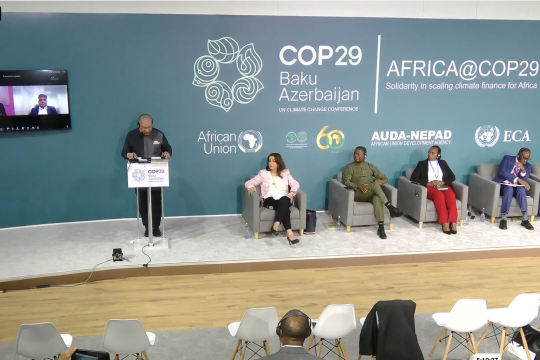The report Measuring the Green Wealth of Nations – Natural Capital and Economic Productivity in Africa was launched at COP 29 in November. EfD’s Director Gunnar Köhlin, who had an important role in preparing the report, is hopeful that it will contribute to the mainstreaming of Natural Capital Accounting (NCA) throughout Africa.
The report was presented at a side event hosted by the African Development Bank (AfDB) on 14 November at the Africa Pavilion. EfD’s Director Gunnar Köhlin was one of the panelists at this event.
Agree to include NCA
It followed a high-level presidential meeting on the theme “Measuring The Green Wealth of Africa” on 13 November 2024 during the World Leaders’ Climate Action Summit of the 29th Conference of the Parties (COP). Fifteen African heads of states agreed to push this agenda, and in their communique, they “recognize the need for a more comprehensive valuation of Africa’s green wealth by including natural capital and call on the African Development Bank Group, other partners and Governments to provide capacity building and support for national statistics bureaus to upgrade their Systems of National Accounts." They also agreed to provide the requisite leadership and support to mainstream the proper valuation of Africa’s natural capital in measuring Africa’s gross domestic product (GDP).
Africa's paradox
In line with this, the report argues that proper valuation of natural resources and ecosystem services—such as forests' carbon sequestration—could boost the GDP of countries, and thereby improve credit ratings that can unlock new investment opportunities.
Africa faces a paradox: it is rich in natural resources but poor in cash. Through natural capital accounting (NCA), countries can reassess their economic value, potentially leading to greener and more inclusive GDP measures that can be the foundation for more sustainable economic policies. If such policies are acted upon, it could also reduce dependence on raw material exports and encourage sustainable resource use.
Enormous potential for carbon markets
The report highlights how several African countries, including Ethiopia, Uganda, and Zambia, are already using NCA to inform their policies. For example, Ethiopia has integrated NCA into its national development planning system to promote sustainable agriculture and forestry. In Zambia, NCA has helped shape strategies to preserve forests, which provide both economic and ecological benefits.
According to the AfDB, the potential for carbon markets is enormous. If Africa's carbon sequestration were valued at European emissions trading (ETS) prices, the Congo Basin's forests´ sequestration alone would be worth an annual value of $77 billion. This realization could spark increased global interest in investing in Africa's sustainable development.
Clear call to action
Despite progress, Africa faces significant challenges. Only 38% of countries on the continent have implemented natural capital accounting systems, and many still use outdated methods to calculate GDP. The AfDB proposes a comprehensive agenda to update the system of national accounts of member countries, and to promote NCA, including capacity-building and regional collaboration.
The report concludes with a clear call to action: Africa must lead global efforts to value natural capital. This is not only essential for the continent's development but also for ensuring a sustainable future for the planet.
Read the report!
